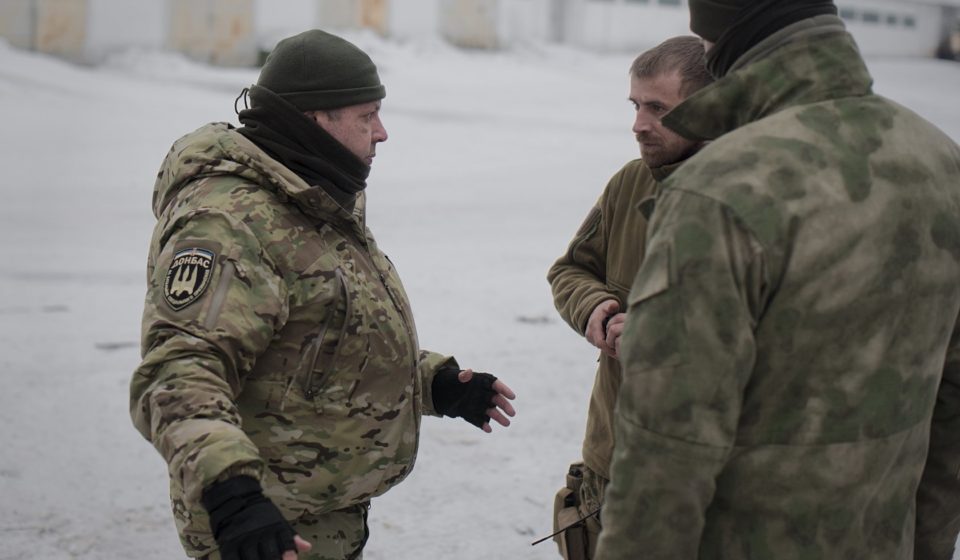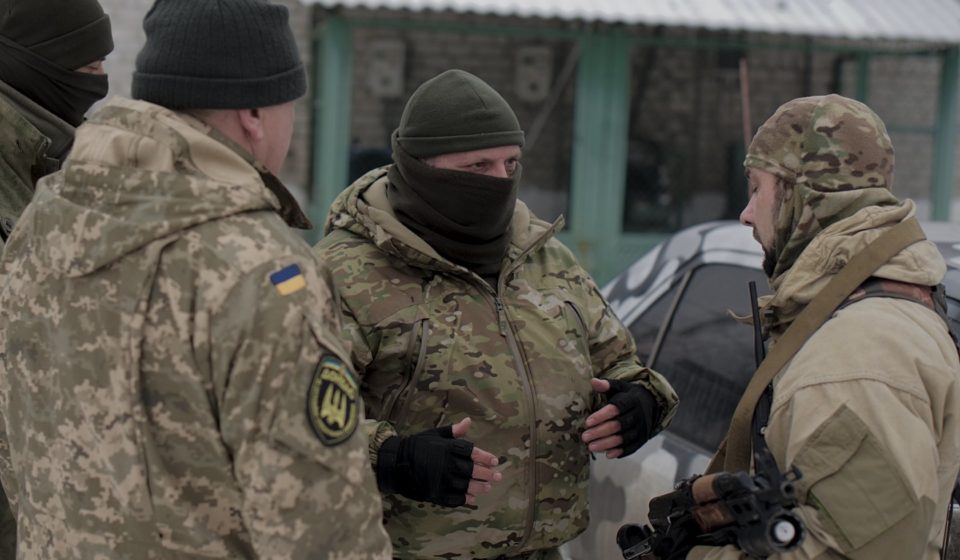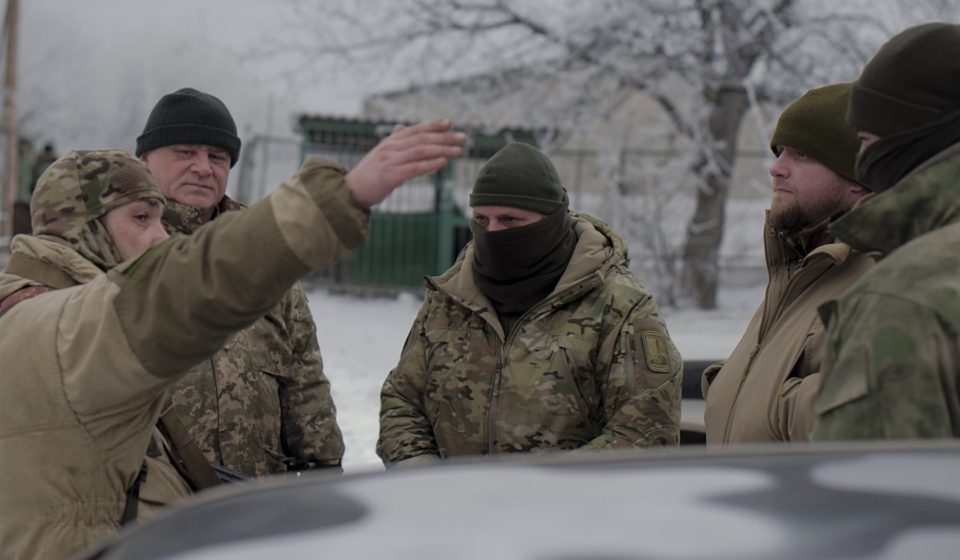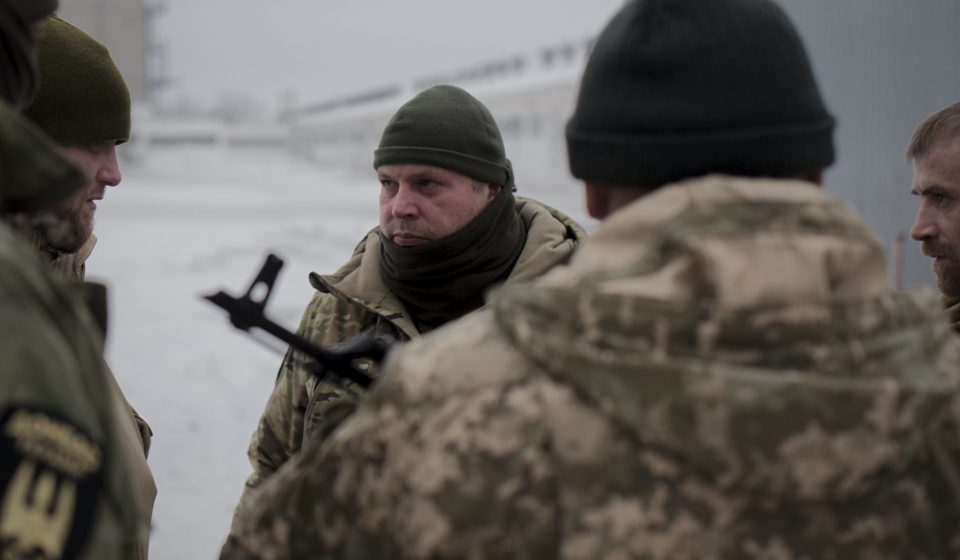AFTERILOVAISK
“Filin”
“ In 2014 I was sure that we would finish the war very quickly.“
Photo by Markiian Lyseyko
Colonel Vlasenko Viacheslav Viktorovych. Codename ‘Filin’ (Eagle-Owl). Now – commander of the 46th separate special-designation battalion ‘Donbas-Ukrayina’
Back in 2006-2007, the Armed Forces of Ukraine were purposefully being destroyed within the campaign headed by the ministers of defense, including Kuzmuk. They are traitors. Traitors who worked for the benefit of the Russian Federation. They did their best for us not to have our army, or the SSU, or the authorities that could organize any resistance in Ukraine.
I did not know what war was like. I had not been in a war before. I was a military man, but my work was more of a civil work in the office, the only thing was that we all wore green uniforms. All the training held then were, as it is now fashionable to say, – ‘fake events’, ‘activity simulation’. That is, people came but nobody was taught anything, soldiers were given an exercise for 12 bullets, they could not even shoot, but they organized different shows, nice performances to which heads of the armed forces and heads of the state came. And they were happy that we seemed ‘to have an army there’.
That was the same as the Independence Day had been celebrated for 24 years. And I always realized that in fact, we did not have any independence, either political or economic.
We were 80 percent dependent on Russia, most probably. And even in 2004 when there used to be ‘Ukraine against Kuchma’ movement, if you remember it (‘Ukraine without Kuchma’, 2001. – Ed.), when people rose – where did he go at first? To Putin, and asked for protection and aid there. That is because of Russia at that moment, the same as in 2014, fully ‘patronized’ all our authorities. And then I decided to leave the armed forces and started living the life of a civilian, worked in business, earned my living. Until late 2013 came, the Maidan. I supported Maidan very sincerely, I was seriously indignant about the fact that ‘Berkut’, with its healthy, big guys could be taken to fight with children and students. And I was already about to go there, but there started unhidden aggression of the Russian Federation, and I knew that I should better take weapons in my hands that go with a miner cask to Maidan. So, I decided I would be of greater use there.
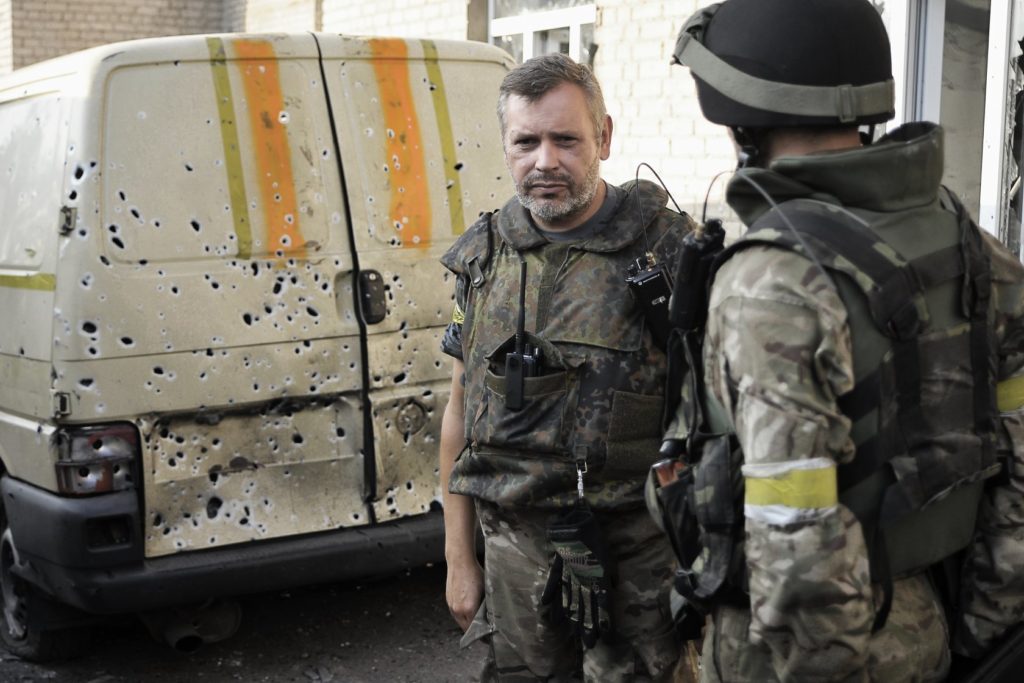
That decision was passed one evening: I was watching the news, and at half past three in the morning – without telling anything to anyone – I took my things and went to the railway station. Nobody knew about it at home. My mother had died before, and my father was alive. Father came to know about it when I was already in Ilovaisk. That was because all the mass media was telling about this. There were photos, and he saw on TV that I was there. Frankly speaking, he was really taken aback.
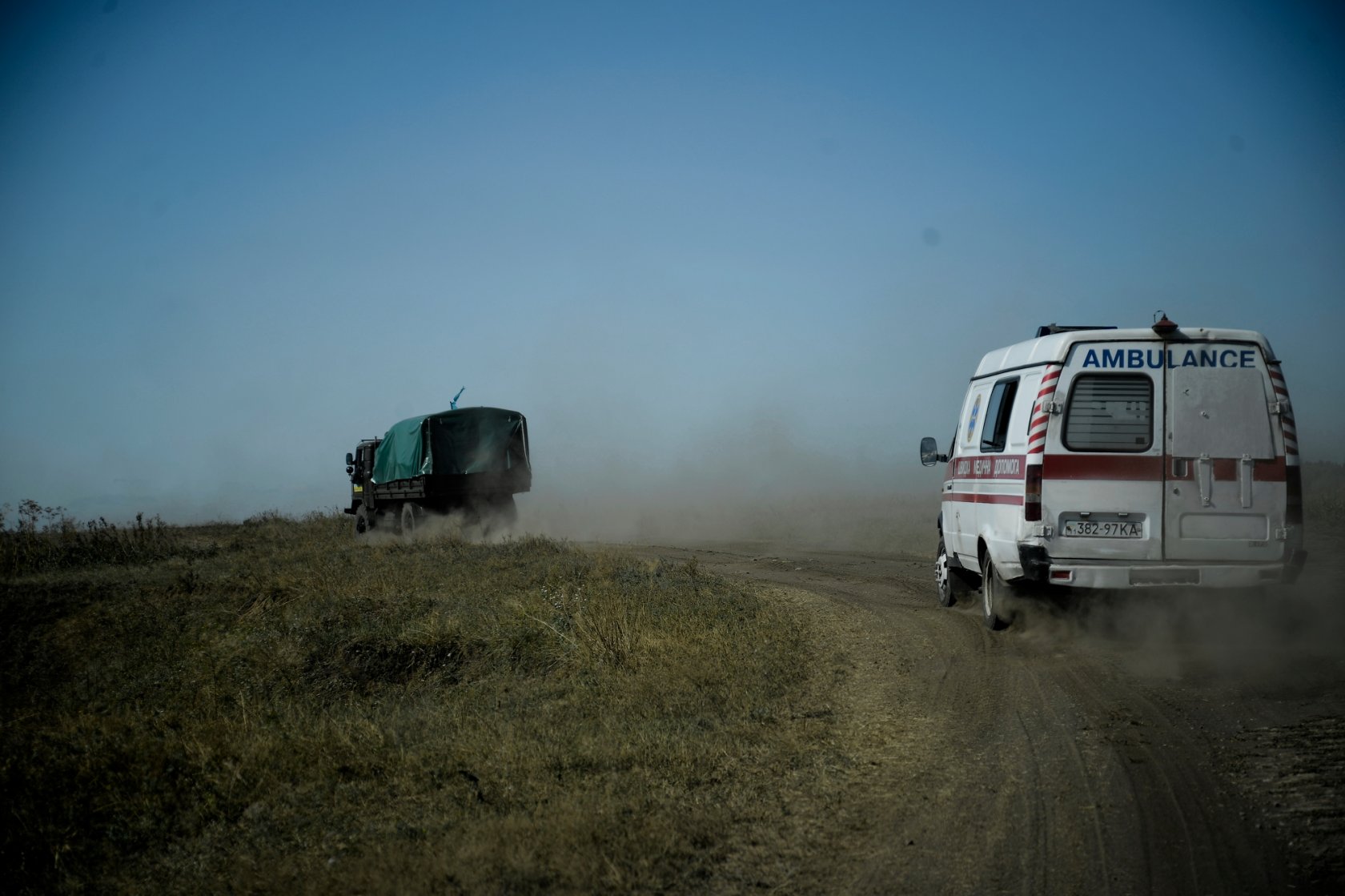
We went to Ilovaisk for 24 hours, and I took only one individual meal pack with me. Our task was to place our checkpoint in Hrabske, to equip the strong point and to take the positions. Later we had to hand them over to the armed forces. Then Semenchenko passed a decision – ‘let us enter Ilovaisk and put our flag there, – and it is done. We will take a picture, and we are great’. And then he would place it on Facebook. After we entered it, we stayed there for almost two weeks. I managed to arrange the supply of foodstuffs and some ammunition. Certainly, we searched dachas and private sector cottages there: we ate grapes, found some jam, tea and even some coffee in the vaults.
The episode which I remember the most from our stay in Ilovaisk was when the rebels tried to burn us. They took nine carriages with coal, sent them to Ilovaisk, and then took a 60-ton platform-carriage, stuffed it with tolite – an explosive used to organize explosions in the coal industry. 60 tons of explosives, do you get it? They intended to hit those 9 carriers with coal at a high speed – there would have been a fire in which no one would have survived. And I came to know about that in advance since they tried to repair the steam train in Ilovaisk. The ordinary one, old, you know, coal-fuelled. But some people, living there till present, railroaders, passed the information to us. We prevented this from happening, and those railroaders did their best not to repair it. After that, they, the separatists in Khartsyzk repaired it and connected it there, but I already had an idea of what they intended to do. Therefore, I sent my mine pickers, and they mined all the rails-trucks in the north and blasted them, and the carriages were overthrown there, there are even some photos on the Internet: and we prevented this awful plan from implementation.
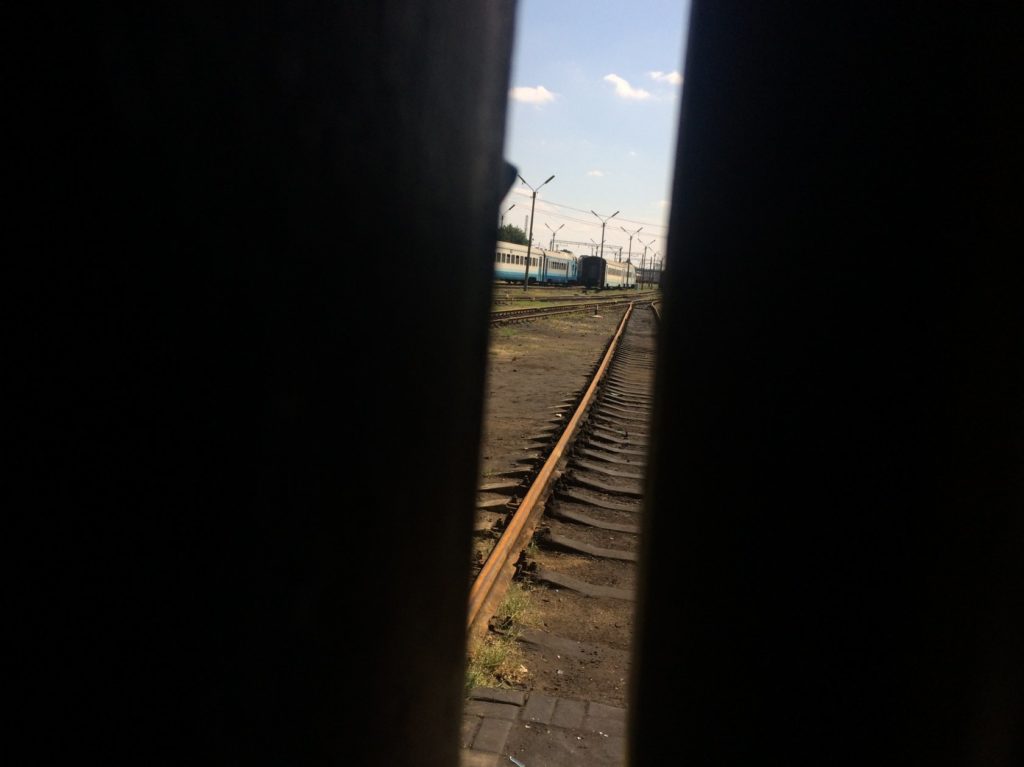
Three-four days before our leave, August 29th, I was contacted by general Khomchak. He said the decision had been passed, and negotiations were going on with the Russians for them to provide us a green corridor for uninterrupted exiting of Ilovaisk. I asked: why did they decide to let us go? I already knew that we were entrapped twice. The first time it was a small circle when they closed the direction towards Hrabske, which was then the only way across the railroad crossing, separatists came to that crossing with Ukrainian flags, there was infantry fighting vehicles, a tank there. And they, by the way, shot dead our guys, whom – and I am sorry for that up till now – I let go to bury their fellows. But then, we, by a joint effort of the battalion and General Khomchak’s group, defeated them and took control over the crossing.
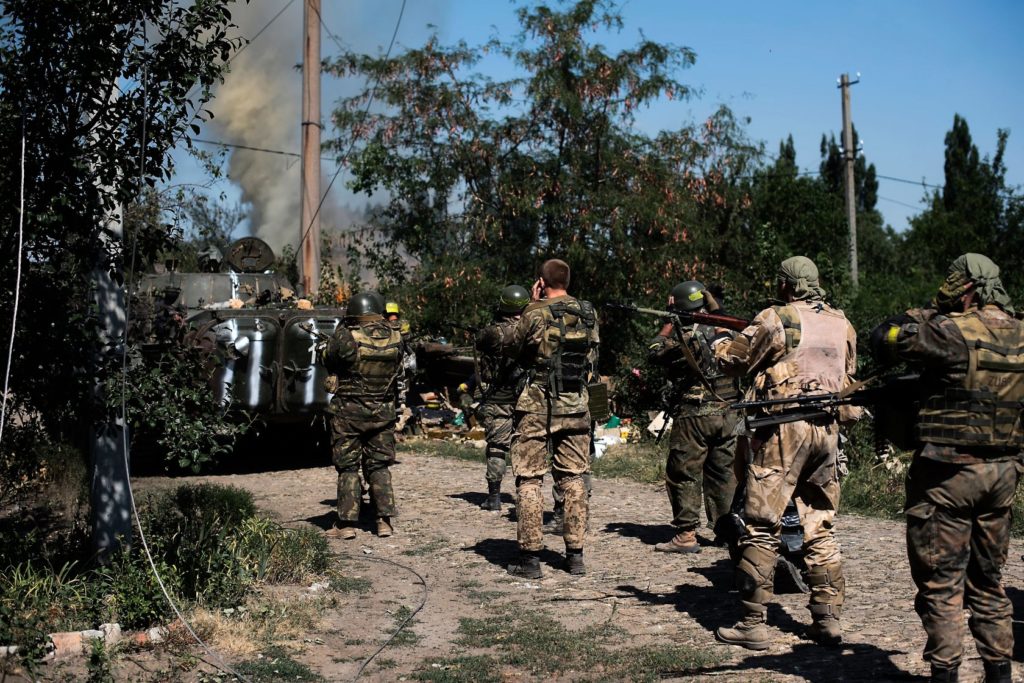
And the second entrapment happened when the Russian army came. That was on August 23rd, right before the Independence Day. And you know, I knew that would happen. I have some intuition, I think logically and were I the enemy, I would have done the same. And then I got the confirmation when we were already existing and I saw with my own eyes how many Russian soldiers and separatists, armed terrorists were there. Over three days we were negotiating exiting with Khomchak using the closed communication channel.
I was waiting for some information until the last moment since circumstances always change. At that moment I had all the battalions in my subordination since I was the only senior officer, who could command in the Ilovaisk operation. Semenchenko was not there, he was generally lucky since he had been slightly wounded in the leg and slightly in the blade.
He also told some stories about a fragment stopped at one millimeter from his heart… That was, most probably, some nonsense for Facebook. I used to manage all the processes since I was acting commander of the battalion. Semenchenko came sometimes, and then spent nights either at rented apartments, or in hotels, or in Dnipro – and came to visit us from time to time. He felt it was scary there, there was some danger, therefore, he almost never came. And after he planned everything in a stupid way … He was obeyed. Since he was a political leader for those people, he was trusted. Though de facto he managed and influenced. He suggested different things. And de jure he had no right to do this since he was never officially registered in the battalion. Since then he would have to bear not just political – which means no – responsibility, but also a legal one. And legal responsibility can be borne by the commander appointed officially only. Well, he told me some stories that he would then go into politics, and therefore he did not need to … And what, what prevents him from getting registered? Well, that was a reluctance to bear responsibility. And it was all confirmed when during the interrogations at the Prosecutor General’s Office he claimed that had never been registered and would not bear any liability. And he was unwilling to. Which means, he is a swindler, who had previously planned how to later avoid liability.
Due to that on the last night before the exiting, on August 28-29th, at 11 p.m. I organized a meeting of the commanders of all units staying in Ilovaisk. The aim was: first, to specify combat crew, how many people and intact, not broken machinery we had. Machinery to leave on. It turned out that there were more than 400 of us. And there was machinery enough for 250 people… Then we with commanders were trying to find a way out of the situation. Tur, the commander of the first assault company, suggested repairing the fire machine, in which he, unfortunately, perished as the result of the tank’s fire.
We had a lot of partially fit machinery: with wheels damaged by a fragment, broken rubber, but it could be driven. Then we passed a decision to look for pulling ropes: we removed electric wires, put those machines in tow. In that way, I found a place for all the soldiers.
And the second question we considered was other exiting options.
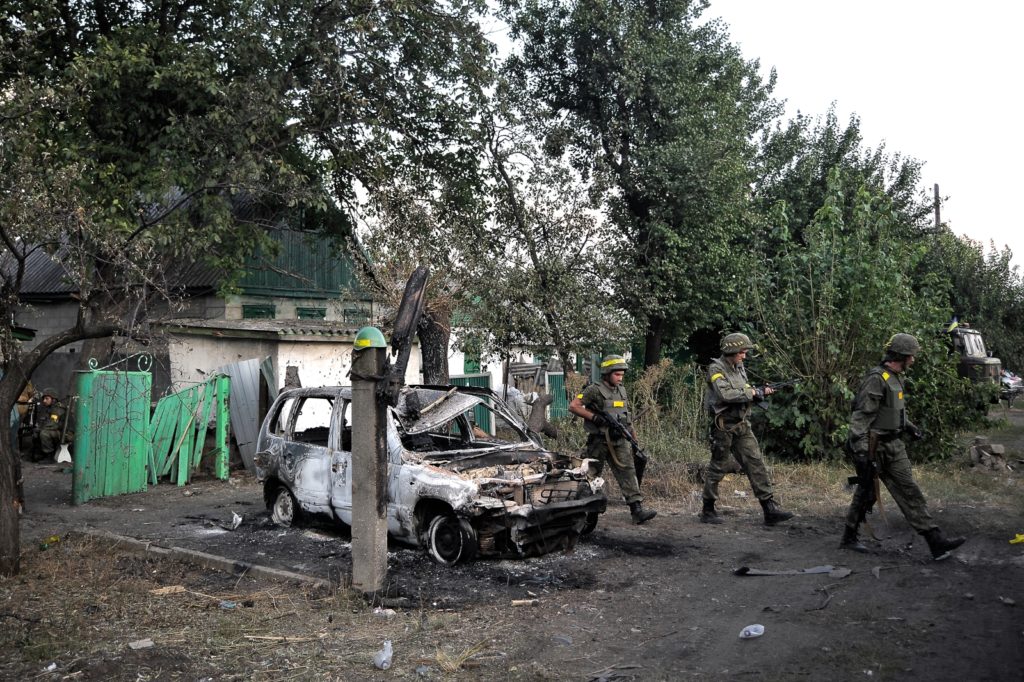
There was an option to go to the North, to go between Khartsyzk and Donetsk. But I told we could hardly manage it since our convoy included over 100 vehicles. Half of them were semi-fit, and the others were in tow. We could move at the speed of 5-15 kilometers per hour. And if we went there, we would be easily caught and attacked at the rear either from the side of Donetsk, or from the side of Khartsyzk, and therefore that option could not be chosen. Then we started thinking about going to the South, towards Novoazovsk and Mariupol. But that was rather far, therefore it was not very much possible that we would reach the destination. And again, our convoy was 3.5 – 4 kilometers long.
The last option I insisted on was as follows: to move towards Mospyno, dismounted. That would be unexpected for the enemy. To go there, to take their positions as the result of a battle. Military forces, their groups there, planned to exit into that corridor, while I planned to go before that, at 2 a.m., towards Mospyno, the distance to which was 7-9 kilometers. To take Mospyno, to take vehicles there and then to move towards Komsomolsk-Volnovakha, across fields. That was my intention from the very beginning.
But at 4 a.m. I was addressed by General Khomchak who told me that at 6 a.m. Russian parliamentarians on two infantry fighting vehicles would come, and that everything was fine. Though we had talked this over with Khomchak, and we were not of the opinion that everything would be that easy. So far there had been no talks about the details of exiting: with weapons on the machinery or any other options. They just talked about exiting Ilovaisk. But at 5 a.m. information arrived that Russians demanded from us to completely leave all weapons, machinery, armored machinery, and leave with our hands up. Hence, I told Khomchak, and he understood it, that they would hardly let us go. That is the whole battalion would be arrested. Russians could not be trusted. They use to lying and would keep lying. But they convinced me again that we could leave through this corridor. We started building a convoy at about 4 a.m. The only thing was that I suggested to Khomchak not to leave as one convoy since all of us could not be taken to one basket, but in two convoys, one going towards Krasnosilske-Yekatierinovka and passing by Komsomolsk more to the south, and the other one going up, in parallel to the first one.
Besides that, I knew that the National Guard’s brigade ‘Bars’ came from the other side, with its almost 5.5. thousand soldiers, as well as armored vehicles, advanced infantry fighting machines, tanks, artillery. My plan was that they would attack to the side, and we would do it from our side since our group was already rather large – 1,500-1,800 people, together with the Armed Forces. This was enough to fight. But psychologically people were demoralized and were ready to give up everything just to leave. That is everybody lived on the idea that tomorrow they would be free, and life would go on.
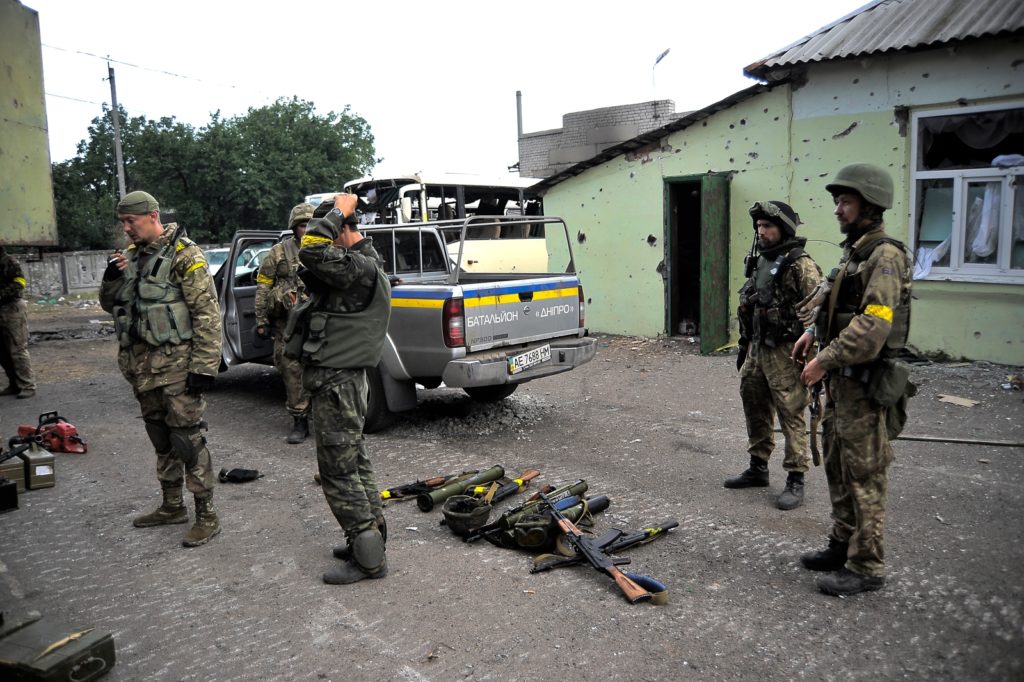
After we formed our convoys at 5-5:30 and started leaving, I stayed in the school, moving around to see if no one was left there besides women and children in the bomb shelter. They were all the time there, and due to that, they did not have a chance to hide during the fire. They stayed there, I said goodbye to them and went outdoors. I had come to Ilovaisk by a gazelle, it was burnt there near the school. That means I did not have even what to drive. The only available vehicle was the bank one, by which I took the wounded people away, and finally, I ordered to load it fully with all the weapons left from those wounded and perished. There was a lot of weapons. I could not pass it – give it to any place, since there is a liability behind weapons. I also found two signal operators. Shamil, who is here with me, by the way, and the Sava, who works as Sobolev’s assistant. Well, and I started driving. We caught up the convoy with our gazelle, and then I took over it. We waited – the units staying in our fire depot, in the south of Ilovaisk, and thus – in columns moved already close to the village, where the checkpoint of the sector was. There we split.
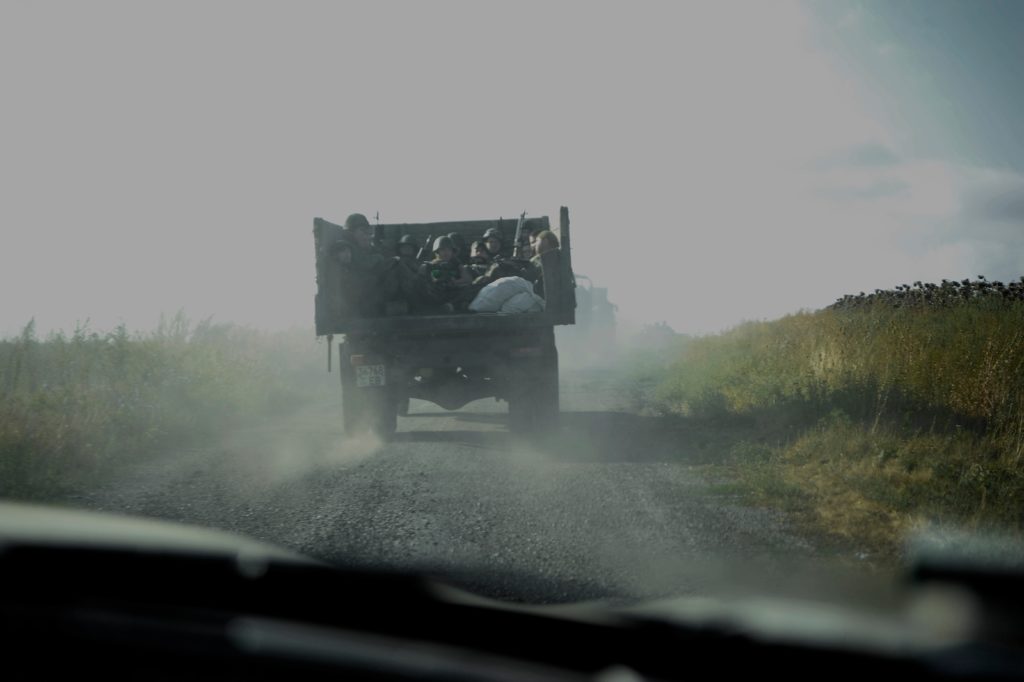
I went ahead, in the convoy, moving to Krasnoselske, since I wanted to meet and listen to those parliamentarians, to what they would tell and what would be the counteractions.
I think the decision to go in two convoys was right. If we all stopped in Krasnoselske, which was under heavy fire, there would have been many more victims. Since people crowded at the place of artillery’s work means a great number of victims. I was in front of the battalion, where my place was.
We were to start moving at 6 a.m. sharp, but 15 minutes to six Khomchak contacted me and said that Russians were not to be trusted and that we should start moving. And we started moving to this ‘green’ corridor.
Artillery bombardment started right away, with martyrs, to the right, to the left from the road. Russians were trying to stop the convoy since our movement was obviously not what they planned.
I commanded by the radio-station to accelerate the movement, we could not stop. If artillery, main guns, firing from the side, were used, one could take ground – and somehow hide from such fire. But when there were mortars, mines falling from above – it was impossible to hide. Unfortunately, our drone aircraft did not work, so I did not know what was ahead, and we were just going at random. The vehicles that already got under fire and were damaged, stopped and closed the way, so we stopped close to Krasnoselske.
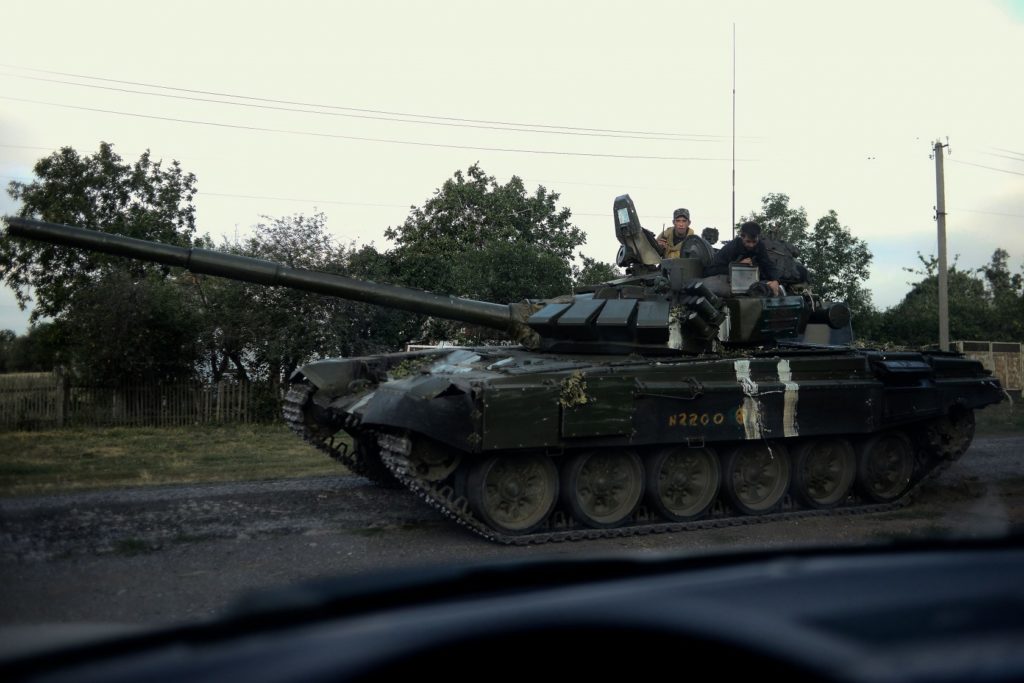
I was going, with the military vanguard in front of me. Several tanks, several infantries fighting machines we had. And it was planned from the very beginning that the avant-garde would consist of those strong points of the servicemen located to the east, to the south from Ilovaisk, then there would go units of volunteers, and then, finally, the 40th and, it seems to me, the 39th battalion. And in case of an ambush or enemy there, avant-garde was to start the battle, then would go infantry from volunteer battalions, and finally – armoured vehicles of the troops coming to help us were supposed to appear over that period from the side of Komsomolsk, and thus we had to destroy the group of enemies, break the circle and exit already in Komsomolsk. But it turned out later that we did not have the rear. Viz.: the battalions that were supposed to be in the rear had started their way a couple of days before, with no authorization, and we did not even know that they had fled from their positions, so it appeared that we had avantgarde, infantry, volunteer units, but did not have anyone in the rear. There was already no backup from the rear.
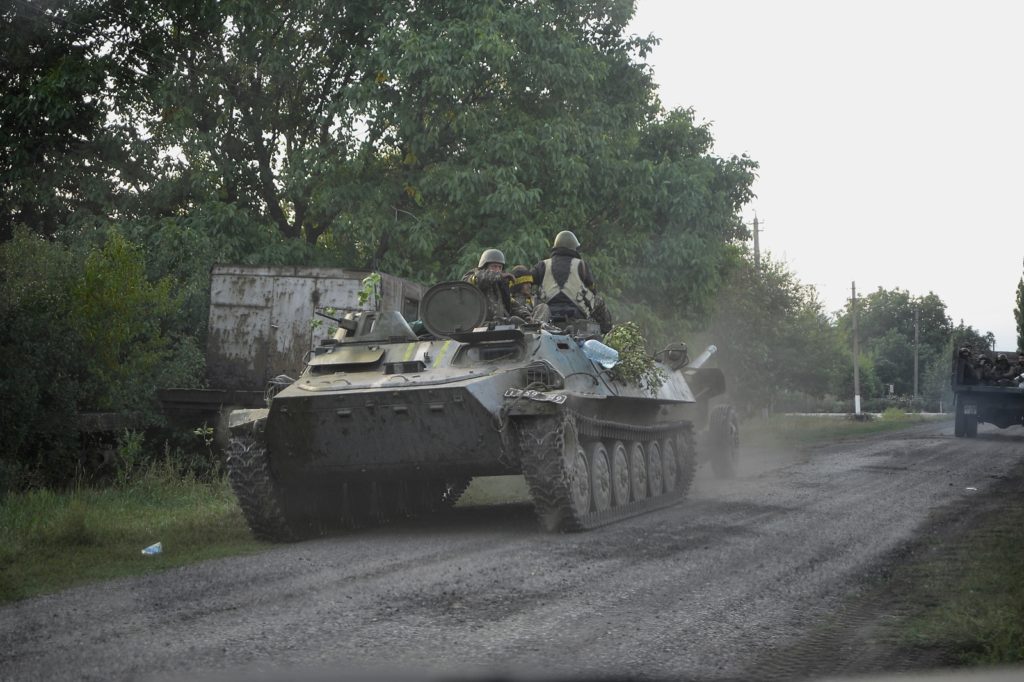
And I consider it to be the main reason for the consequences of our exiting. Now the Prosecutor General’s Office is looking for those guilty and those to blame. I think it is the fault of those units that were supposed to enhance our power in the rear. Even more, that from the side of the ‘great land’, artillery in the enemy’s positions worked very well. Even with the support of some aviation, two planes, strike-fighters, one of which was shot down. That is support arrived, one cannot say that we were as blind kittens. No. But since we did not have the rear, we could not increase our pressure on the enemy, and due to that, the convoys stopped. I moved one thousand seven hundred meters from Krasnosilske to the high hill, a vehicle came there to take the servicemen, and after that, we got back to the second ambush, of which generally there were three. Which means that it was just impossible physically to find one’s way there. In the second ambush, our vehicle was damaged, it could go only in first gear, and it found itself in the field. The troops of the enemy surrounded the field. We left the vehicle since it was heavily damaged and fired. And we crawled some two hundred meters and stayed in the field. Semenchenko called to my mobile phone, and I told him that I was between the enemy’s positions in the field. And he answered for some reason: ‘Fine, then go back, our guys are encircled there’. In fact, they were not, they were staying in the inhabited settlement. And I was in entrapment.
Russians could not be trusted. They use to lying and would keep lying.
I contacted the ATO headquarters via satellite communication. I was told to wait for further guidance. Thus, we stayed in the field till evening. And already when darkness came, we crawled to the nearby forest belt. We thought we would leave that way. When we managed to go across the forest belt, there was a very long lake there, close to Yekaterynivka. There was a bridge and ambush there, and after the lake, the field started again. And in that forest, we came across some thirty servicemen of the AFU. They were extremely scared, half of them had left their weapons. There was also a lieutenant colonel, the officer of the headquarters of land forces, the commander of the 46th special operations group which had been staying in the north of Ilovaisk. I will point it out that he was a very brave officer. And even in captivity, he proved to be a courageous, brave person. If we had more people like this! Now we communicate, he is still at service.
And after that I contacted the headquarters of the ATO, and I was told that in the morning there would be a convoy of the Red Cross going along Komsomolske, and we could join them, they would take us with them. The only thing was that they would take wounded or people with no weapons. They would not take us with weapons. So, I ordered to dig the weapons in the forest. It was partially disassembled, parts were thrown into the lake, some parts were dug-in. When we approached the road, instead of the Red Cross there appeared to be several airborne armored infantry fighting vehicles of Russians with intelligence officers on them, and they arranged an edge around us. I don’t know whether that was a coincidence. We were taken captive. After that, we were taken on foot for several kilometers to the heights filled with Russians. There were tanks, airborne armored infantry fighting vehicles, heavy-caliber guns.
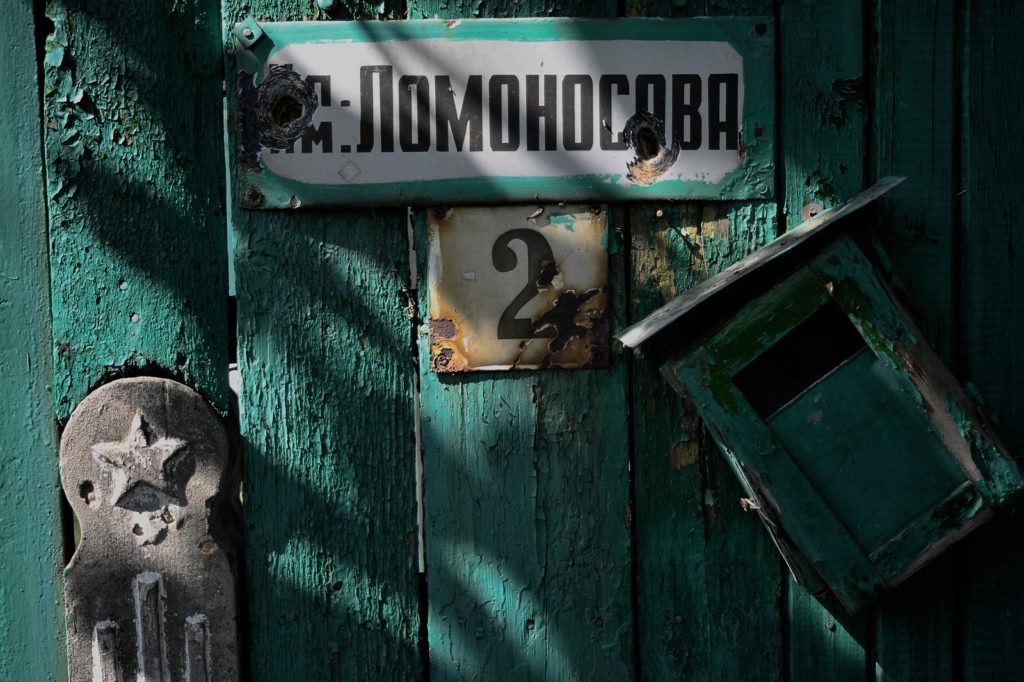
They took us to that mount, had a search. They tied us, and there was a large pit, twenty by ten, on the mount. They placed us in that pit. They separated the volunteers from the AFU. At night they oppressed us: beat hit with guns on our heads, simulated shootings. We were lucky that we were already very close to our positions, close to Komsomolske, and negotiations were going on there, and they told that the day before some of the soldiers had already been transferred to the Red Cross. And they were settling the fate of the others. We were placed in the pit where just several people were left.
There were Russians from the 311th airborne infantry regiment, as far as I know, – from Kostoroma. In the daytime, we were guarded by the Russians, in the nighttime – by separatists. Separatists were doing their best to show that they were the commanders in the situation. They oppressed us, intimidated. In the morning we were all tied, blindfolded and thrown into those brand-new Russian KAMAZs, and then for about an hour, maybe longer, we were driving in circles, but as I understood they were taking us close to Donetsk, I was guided by the sun. There FSS interrogated every combatant. They did not conceal that they were the representatives of the FSS, they even introduced themselves. There were senior officers there, from major and upwards. They recorded that all, but we were all blindfolded.
They thought they had won the war. Their attitude was arrogant. The only thing was that soldiers when we were staying in that pit, in captivity, treated officers well. If somebody asked for water, they allowed us to take empty bottles and go to the lake – though the water was stinking there, – but still, that was something. We took water from that lake and got back. And then I was given several individual meal packs – one pack for ten-twelve people.
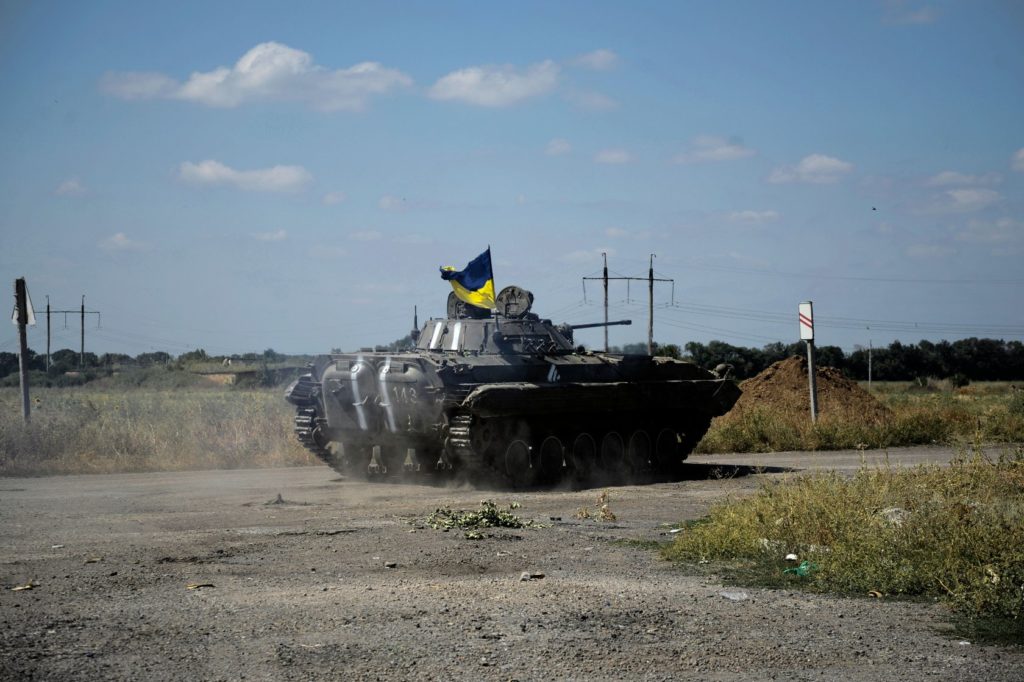
Among the servicemen with whom we were taken captive, there was only one who knew me, codename ‘Kinzhal’ (‘Dagger’). But he did not give me away. Also, three of my combatants knew me: the driver and two signallers. But they also did not give me away.
Finally, I was asked: ‘What are you doing here, old man?’. And I told them: ‘I have come here to earn some money’. For them, it was a good reason since they all came there to ‘earn some money’. After the interrogation, we were placed back into those KAMAZs and taken somewhere. They were driving for a long period, and finally left us near the lake and gave a chance to unfold our eyes, and it appeared we were on some beach. There were those ‘mushrooms’ against the sun, close to a large lake. As far as I understand, that was closer to Komsomolsk. There were about three hundred of us. And then I saw the Red Cross convoy. In fact, it consisted of some military and volunteers’ vehicles. Which means they were not from the Red Cross, they just collected everyone who could be collected, who could go and sent them to pack us up. After that some talks were going on for about an hour, we were taken into the vehicles and driven towards Volnovakha. On our way, we made a stop and I went separately, with ‘Zhak’.
I was brought to Kurakhovo, there I got myself into order and went to Dnipro, and Semenchenko called me, saying that he was very glad I was alive. Though I did not trust him too much. It appeared that when I was in the field, after having a talk with me, he called Yatsyk who was in Krasnoselske and told that Filin had already exited in Kurakhovo, that he was in sauna there, with girls, and that everything was alright. Which means that the person lied and always tried to bring about the division between me and the combatants. But as he was not brought to account then, unfortunately, the situation is the same now.
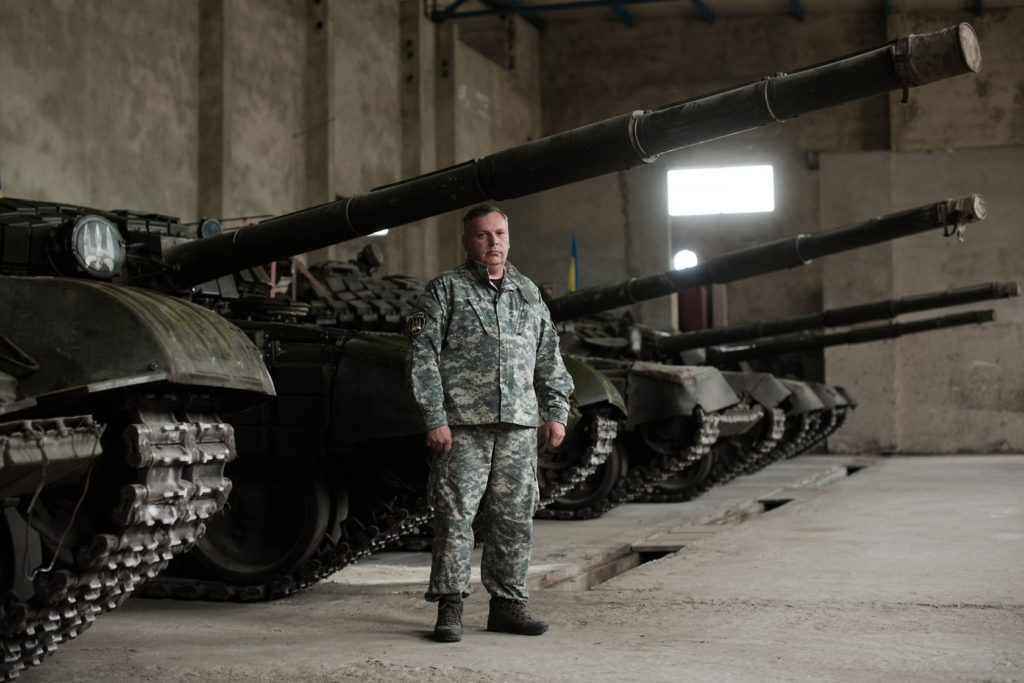
In 2014 I was sure that we would finish the war very quickly. We liberated one town after another. 7-10 inhabited settlements were liberated by one battalion only. If we consider existence of many other battalions, and the armed forces, I thought that by the end of November we would reach our borders. And the LPR-DPR’s gang also realized this. That is why in August when separatists did understand that their time was about to be over, addressed Putin. And I was in captivity, I already saw their number and their mood, I realized it during my talks with the Russians that they were just zombified: told stories about ‘junta’ and ‘banderivtsi’, about oppression against Russians and Russian-speaking people. I realized that the war would be longer.
When I stayed in captivity, my only wish was to escape to go on, and it was there that I got a dream to arrange a combatant, military unit to beat Russians and separatists. Clearly, it is all influenced by politics, there are certain secret plans of the state rulers to that, as well as political plans developed in communication with international partners: Poland, America, Europe. It all influences the current situation. But at that time, it was all about the quicker we move, the quicker we would kill all these deuces, and the sooner we will gain victory in the war.
What dreams? To continue fighting our enemy.
You know, I am the person responsible for my things. I have a battalion in which I serve and with which I fight. In 2014 I came as a machine gunner, but that was not my scale. I had only my knowledge. One person has a gun and fights with the gun, I have a battalion and I fight with the whole battalion, and I destroy much more than I would be just a machine gunner or rifleman. But, on the other hand, I am not trying to jump over my head. For many people who are here now career is of importance. I was offered many different positions. Even top ones, but I came here not for this sake, and I am not going to stay here after this situation, war or ATO, whatever we call it, comes to its logical ending. I will leave, and the Armed Forces will remain, let them continue.
Now I have a dream to end the war, to reach the border. I had this dream in 2014, and nothing has changed. I am just developing. The battalion becomes better armed, better trained, with better staff, and thus it can perform more important tasks. But my dream remains the same – to finish it and then go to schools to meet children and tell them how we defended our country.
I am 48. I have been hearing all my life long that we are friends and brothers with Russians. Who could think that such a thing would start? And they used it. Since Russia is a sly country-aggressor. It always lied and waged a war. Do you know how much truth will now come to the surface? It is already coming, and will still come: the trust about the Second World War, the Great Patriotic War. Let us recall the ‘international duty’ in Afghanistan. That was direct intervention into the other country. But it used to be lies, everything was concealed, disguised, and it all lasts.
We realize that Ukraine is not capable of waging a war from the economic point of view. Or everything should be taken to the military rails: deposits should be taken away from citizens, everything, all the reserves – gold, currency – should be fully spent on this war. Russia has spent 160 billion dollars on this war over 3 years. It is easy to guess that we spent no less, or even more. While the budget of Ukraine is 13 billion, with kopecks. The question arises: where from did we take the money? Those who pay order the music. We all know this truth. But if someone who has ordered the music says we should not attack, then we don’t. And the reason is very simple: operation ‘Novorosiya’ from Odesa to Kharkiv region. Over 4 years, or even more, titushkas were trained there, military patriotic organizations were established there, weapons were brought, storage facilities were arranged, etc. And all those titushkas appeared to be in nine regions. And we did not allow them to take over. By we I mean Ukrainians – we did not allow this infection to spread. But out of 9 regions, they took one-third of Donbas in full.
I am very sorry that Ilovaisk is perceived as a tragedy. Since with such tragic perception, we forget about or do not see all that bravery and heroic activity of our combatants in Ilovaisk
Well, we could have seventh, eighths, tenth mobilization, and hire a million of Ukrainians. There would be enough rifles. And the battle would start. I guess, for some 7-8 months, maybe a year, and we would liberate this one-third of Donbas and reach the border on Russia. But there is one ‘but’. On that part, on one-third of Donbas, there reside three and a half millions of peaceful residents. Including pro-Ukrainian ones. And Russian nationalists. And zombified people. But they are Ukrainians. And with such active combat actions there would perish from 500 thousand up to 1.5 million of city residents. And Hague does not ask who is right and who is to blame, they just ask one thing: why did unarmed, peaceful residents perish? The next question is: who will undertake responsibility for all this? Right, on Facebook I read that there are Hebbels who claim that ‘we don’t care, the main thing is to liberate the country!’. Right, that is the main thing, but we should look for other ways. Since the most precious thing in the world is human life. If there is a way of international economic pressure, if there are some agreements, for the sake of human life one may agree even with the devil. Since we are in such a situation ‘Well, so what? A million and a half of Ukrainians will perish!’ Send your parents there to Donetsk, and I will be firing there from all calibers.
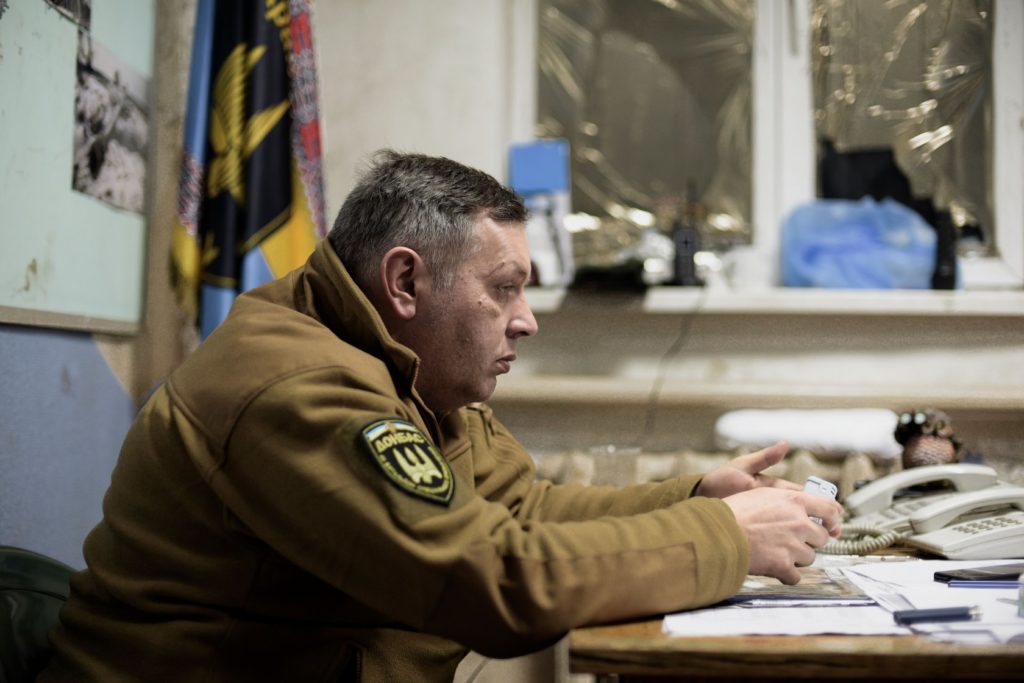
I am very sorry that Ilovaisk is perceived as a tragedy. Since with such tragic perception, we forget about or do not see all that bravery and heroic activity of our combatants in Ilovaisk. Right, people perished, got into captivity, went missing. But we all knew why we went there and realized the possible consequences. We must commemorate those who perished. But one cannot forget the live combatants who have survived after Ilovaisk, 2014, in the most active phase, since everybody in the authorities was at a loss, the management of the Armed Forces were at a loss, and nobody knew what to do. But volunteers showed that they could not just help somewhere, as military volunteers, we took the whole pressure of 2014 onto our shoulders, and together with the Armed Forces, and quite often – ahead of them – we beat the enemy.
Ilovaisk should be depicted as the great battle in which people showed the best traits of their character. That was heroism. That was the turning point. Ilovaisk launched Minsk agreements. Ilovaisk compartmentalized it all: what could be done further and what we could do. And people throughout Ukraine say that Ukrainian fighters, people, citizens can protect their country. That is what Ilovaisk is for me, and not just a ‘tragedy where people perished’.
Military men and political scientists should make their assessment of Ilovaisk and the work of battalions. By the way, if it went according to my plan, as we planned in Kurakhovo to work from Maryinka, and the main direction was towards Yasynuvata, Spartak-Yasynuvata, things would have gone differently. And our intelligent officers went there: they knew every corner in that Spartak, and Spartak is between Donetsk and DAP. If we took that DAP, as we planned, took Spartak, cleaned it, deployed there. Nothing would have obstructed us on the way along the highway to reach the center of Donetsk, to taking all the buildings there, including the SSU, etc. I don’t have any doubt that the course of the war would have been different. But Semenchenko decided to go to Ilovaisk. After that would mean DAP, and Debaltseve, etc. Unfortunately.


